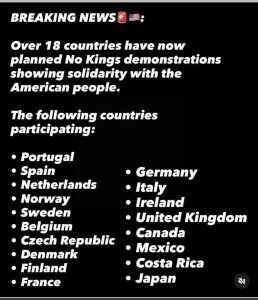This weekend, activists across the United States are organizing “No Kings” protests aimed at opposing perceived authoritarianism. Marking the fact that America has not had a monarch for over 91,000 days, these demonstrations—expected to number over 2,500 nationwide—serve as a symbolic defense of the republic against any form of monarchy. The protests are largely led by self-described progressives, including retired professionals and academics. However, critics argue the events have become more performative than impactful, with attendance expected to be much lower than during previous mass protests.

Interestingly, the “No Kings” movement has gained international attention, with protests planned in at least 18 countries, including several constitutional monarchies such as the United Kingdom, Spain, Sweden, and the Netherlands. This has sparked irony and criticism, given these countries continue to recognize kings or queens as their ceremonial heads of state. Activists abroad appear to be expressing solidarity with the American protestors, even while living under monarchies themselves. Some events in the UK focus on opposition to American politics rather than their own royal families, reflecting a broader trend of global progressives engaging with U.S. domestic issues as if they were international spectators.
Ultimately, these protests highlight a deeper political divide rather than a genuine concern about monarchy or tyranny. Observers note that the “No Kings” rhetoric serves as a stand-in for broader criticisms of current U.S. political leadership and policies. While the spectacle of protesting monarchy may attract attention, it underscores how political theater and symbolism often overshadow substantive dialogue. For countries still ruled by monarchs, the irony of joining such protests adds a layer of complexity to the global conversation on governance and democracy.




